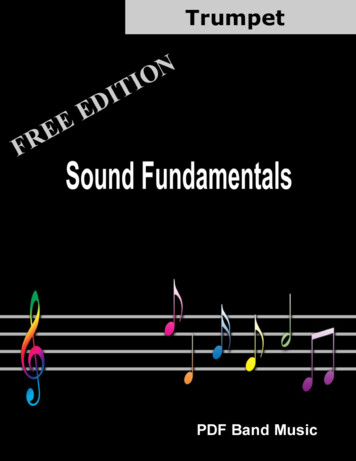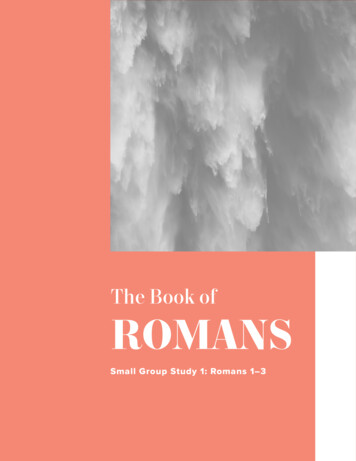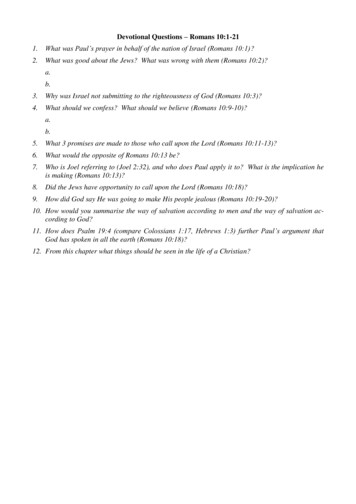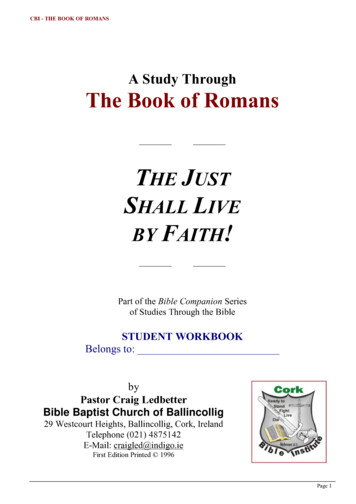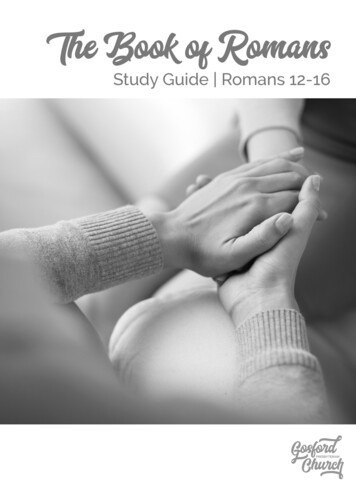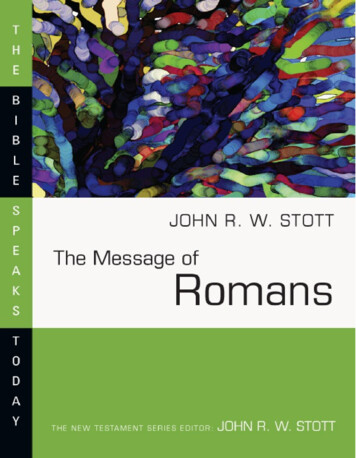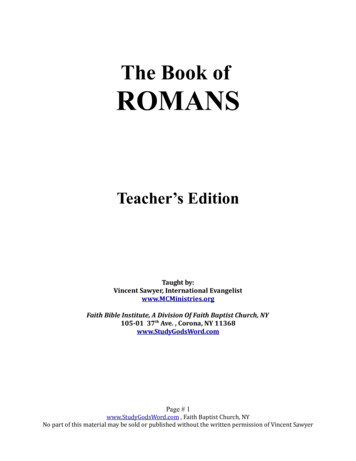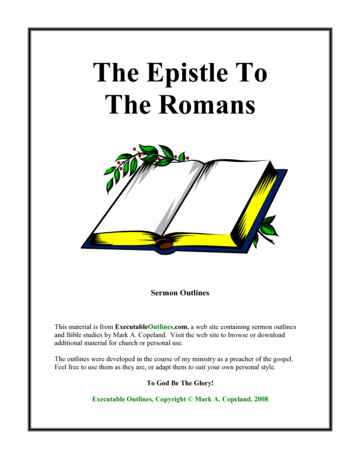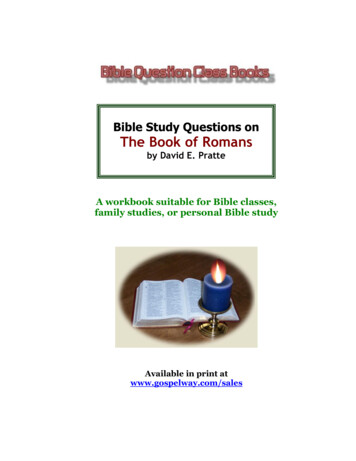
Transcription
Bible Study Questions onThe Book of Romansby David E. PratteA workbook suitable for Bible classes,family studies, or personal Bible studyAvailable in print atwww.gospelway.com/sales
Bible Study Questions on the Book of Romans:A workbook suitable for Bible classes, family studies,or personal Bible study Copyright David E. Pratte, 2013, 2014Minor revisions, 2016All rights reservedISBN-13: 978-1496057419ISBN-10: 1496057414Printed books, booklets, and tracts available atwww.gospelway.com/salesFree Bible study articles online atwww.gospelway.comFree Bible courses online atwww.biblestudylessons.comFree class books atwww.biblestudylessons.com/classbooksFree commentaries on Bible books atwww.gospelway.com/commentaryContact the author atwww.gospelway.com/commentsNote carefully: No teaching in any of our materials is intended or should ever beconstrued to justify or to in any way incite or encourage personal vengeance orphysical violence against any person.“He who glories, let him glory in the Lord”– 1 Corinthians 1:31Front Page PhotoThe Colosseum in Rome(Photo in the public domain)Scripture quotations are generally from the New King James Version (NKJV), copyright 1982,1988 by Thomas Nelson, Inc. used by permission. All rights reserved.Workbook on RomansPage #2
Other Books by the AuthorTopical Bible StudiesGrowing a Godly Marriage & Raising Godly ChildrenWhy Believe in God, Jesus, and the Bible? (evidences)The God of the Bible (study of the Father, Son, and Holy Spirit)Grace, Faith, and Obedience: The Gospel or Calvinism?Kingdom of Christ: Future Millennium or Present Spiritual Reign?Do Not Sin Against the Child: Abortion, Unborn Life, & the BibleTrue Words of God: Bible Inspiration and PreservationCommentaries on Bible BooksGenesisJoshua and RuthJudges1 SamuelEzra, Nehemiah, and EstherJobProverbsGospel of MarkGospel of JohnActsRomansEphesiansPhilippians and ColossiansHebrews1 & 2 PeterBible Question Class BooksGenesisJoshua and RuthJudges1 SamuelEzra, Nehemiah, and EstherJobProverbsEcclesiastesIsaiahGospel of MatthewGospel of MarkGospel of LukeGospel of JohnActsRomans1 Corinthians2 Corinthians and GalatiansEphesians and PhilippiansColossians, 1&2 Thessalonians1 & 2 Timothy, Titus, PhilemonHebrewsGeneral Epistles (James - Jude)RevelationWorkbooks with Study NotesJesus Is Lord: Workbook on the Fundamentals of the Gospel of ChristFollowing Jesus: Workbook on DiscipleshipGod’s Eternal Purpose in Christ: Workbook on the Theme of the BibleVisit our website at www.gospelway.com/sales to see a current listof books in print.Page #3Workbook on Romans
Bible Study Questions on the Book of RomansIntroduction:This workbook was designed for Bible class study, family study, or personal study. The classbook is suitable for teens and up. The questions contain minimal human commentary, but insteadurge students to study to understand Scripture.Enough questions are included for teachers to assign as many questions as they want for eachstudy session. Studies may proceed at whatever speed and depth will best accomplish the needsof the students.Questions labeled "think" are intended to encourage students to apply what they have learned.When questions refer to a map, students should consult maps in a Bible dictionary or similarreference work or in the back of their Bibles. (Note: My abbreviation "b/c/v" means "book,chapter, and verse.")For class instruction, I urge teachers to assign the questions as homework so students cometo class prepared. Then let class time consist of discussion that focuses on the Scripturesthemselves. Let the teacher use other Scriptures, questions, applications, and comments topromote productive discussion, not just reading the questions to see whether they were answered“correctly.” Please, do not let the class period consist primarily of the following: "Joe, will youanswer number 1?” “Sue, what about number 2?" Etc.I also urge students to emphasize the Bible teaching. Please, do not become bogged downover "What did the author mean by question #5?" My meaning is relatively unimportant. The issueis what the Bible says. Concentrate on the meaning and applications of Scripture. If a questionhelps promote Bible understanding, stay with it. If it becomes unproductive, move on.The questions are not intended just to help students understand the Scriptures. They are alsodesigned to help students learn good principles of Bible study. Good Bible study requires definingthe meaning of keywords, studying parallel passages, explaining the meaning of the text clearly,making applications, and defending the truth as well as exposing religious error. I have includedquestions to encourage students to practice all these study principles.Finally, I encourage plain applications of the principles studied. God's word is written so soulsmay please God and have eternal life. Please study it with the respect and devotion it deserves!For whatever good this material achieves, to God be the glory.You can find Bible study commentary and notes to accompany many of our Biblequestion workbooks at www.gospelway.com/sales David E. Pratte, June 21, 2017Workbooks, commentaries, and topical studies for sale in print atwww.gospelway.com/salesTo join our mailing list to be informed of new books or special sales, contact theauthor at www.gospelway.com/commentsWorkbook on RomansPage #4
Assignments on Romans - IntroductionPlease read the passages listed below and answer the following questions:1. Who wrote the book of Romans (see 1:1)? List things you know about the author.2. To whom is it addressed (1:7)? List some things you know about this church and about thecity where it was located.3. Note Romans 15:25-27 and cross-references. What can we conclude about when the bookwas written?4. Skim the book and state its theme. Note 1:16.5. Study Romans 1:16; 10:14-17. Define “gospel” and describe the role of the gospel in man’ssalvation (cf. Mark 16:15,16; 1 Corinthians 15:1-8).6. Study Romans 2:17-20,25; 10:5; 3:19-23,28; 7:1-7. Define “law.” What law is primarilyreferred to in these verses? What problem did people have living under the law?7. See Romans 5:1,2,20,21. Define “grace.” What advantage does grace have over law?8. See Romans 5:1; 1:16; 10:13-17. Define “faith.” Why is faith important in the gospel?9. Study Romans 2:5-11; 6:3,4,16-18. Define “obedience.” What is taught in these passagesabout the importance of obedience?10. List other New Testament passages showing obedience is necessary to salvation.11. Ongoing Assignment: Begin a list of passages in Romans that show obedience isnecessary to salvation. Add to the list as we proceed through the book.Page #5Workbook on Romans
Assignments on Romans 1Please read Romans 1 and answer the following questions:1. What inspired man wrote this book? How does he describe himself – 1:1?2. Special Assignment: List at least 4 characteristics or abilities of apostles. Give at leastone passage for each.3. What is special about the gospel according to 1:1,2? List some Old Testament passagesthat promised the gospel.4. Who is the gospel primarily about – 1:3? What ancestor was in his lineage?5. Give other passages that show Jesus’ relationship to David. Why is this important?6. Whose Son was Jesus besides the seed of David – 1:4? Why is this important?7. What evidence is listed that demonstrates Jesus’ relationship to God? List passages thatconfirm this event really happened.8. Special Assignment: Explain how the resurrection proves Jesus is God’s Son.9. What had Paul received from Jesus – 1:5? To whom was he appointed to teach about faithand obedience?10. What is the connection between obedience and faith in v5? Explain the significance.11. Special Assignment: Study other passages about our “calling” – 1:6. How does Jesuscall us? To what were we called?Workbook on RomansPage #6
12. How did Paul greet the Romans – 1:7? What were they called to be?13. Case Study: Some people believe saints are very good Christians who have died. Define“saints.” List other passages showing how and when a person becomes sanctified.14. How did Paul describe their faith – 1:8? (Think: Why was this important?)15. What assurance did Paul give them – 1:9? What request did he make – 1:10?16. What 2 reasons did Paul give why he wanted to see them – 1:11,12?17. Special Assignment: Define spiritual gifts. List passages showing how apostlesimparted spiritual gifts to people.18. What had Paul planned to do – 1:13? Why had his plans failed?19. What debt did he owe – 1:14? (Think: Why did he owe this? What can we learn?)20. To whom did he seek to preach – 1:14? Define the terms and explain the meaning.21. What did Paul want to do as a result of his debt – 1:15?22. Application: What is necessary for one to be “ready” to preach/teach the gospel? (Think:Are you ready to preach/teach it?)Page #7Workbook on Romans
23. Case Study: Some claim that “gospel” includes only how to become a Christian, so itshould be preached to the lost; but “doctrine” refers to how to live as a Christian and should bepreached to the saved. Explain how Paul’s statement relates to this view.24. Why was Paul not ashamed of the gospel – 1:16? List other passages about the power ofGod’s word.25. Application: List ways people show a lack of faith in the power of the gospel.26. What condition is stated for salvation in v16? Who can meet this condition? (Think: Whatapplications would v16 have to people who still bound the Old Testament?)27. Application: Give examples of things we will (or will not) do if we are not ashamed ofthe gospel.28. What does the gospel reveal – 1:17? Define “righteousness.” (Think: What is meant hereby the righteousness of God? Cf. Philippians 3:9.)29. Explain the meaning of “righteousness from faith to faith” (cf. Galatians 2:16).30. What Old Testament passage is quoted in v17 (give b/c/v)? What does it teach?31. Define wrath, ungodliness, unrighteousness.32. What did ungodly, unrighteous men do – 1:18 (check various translations)? How mightpeople be guilty of this?Workbook on RomansPage #8
33. What did the people know – 1:19? According to the verse, how did they know it? (Think:Consider ways God made this known. Later verses will describe it further.)34. Why are men without excuse if they do not know God – 1:20? How could they learn aboutGod?35. What attributes of God can be known in this way?36. Application: Explain how the creation teaches about God. What application does thishave to evolution?37. Despite the evidence, what error did people commit – 1:21? What was the consequence?38. How did these people view themselves? How did God describe them – 1:22?39. Application: Does this description fit any people today? Explain how people may besimilarly guilty today.40. How did these errors affect people’s idea of God – 1:23?41. What errors occurred in their worship – 1:25?42. Application: Give examples in which people do such things today. Why should peopleknow better than to do this?Page #9Workbook on Romans
43. What attitude did God take toward them? What kind of conduct did they become involvedin 1:24?44. Special Assignment: As the decline of these people is described, consider how theirconduct relates to their previous errors. How does their refusal to worship God lead to theirworship of idols? How does that lead to immorality, etc.?45. What practice is described in – 1:26,27? List expressions used here that prove whatpractice is referred to.46. Special Assignment: Explain how such practices follow from and are associated withthe errors described in 1:18-25.47. What is the natural order regarding sexual expression? Give b/c/v to prove it.48. Explain what Paul says that proves homosexual practices are not only evil but alsocontrary to nature.49. Make a list of other expressions in 1:26-28 that show how God views this practice.50. Compare Romans 1:26,27 to Leviticus 18:22,23; 20:13,15,16. List similarities between thepassages. What can we learn from comparing these passages?51. What does the Bible teach about marriage and sexual fulfillment that shows thathomosexuality violates God’s plan for marriage? Give b/c/v.52. List and explain other passages that discuss homosexual practices.Workbook on RomansPage #10
53. List some penalties that this error leads to – 1:27.54. How does God react to such people – 1:28?55. From 1:29-31 make a list of practices that often characterize the lives of people who turnaway from God. For each item, define it, and give other passages about it.56. When people practice such things, what punishment do they deserve – 1:32? List otherpassages about this consequence and explain the significance.57. Why is it “righteous” for God to so judge such people?58. Besides those who practice such things, who else is also worthy of punishment?59. Application: Give other passages about the problem of approving or consenting to thesins of other people. Give examples of how we could be guilty.60. Briefly summarize the main point Paul is making in Romans 1:18-32.Page #11Workbook on Romans
Assignments on Romans 2Please read Romans 2 and answer the following questions:1. Chap. 1 discussed a group of people who were without excuse. Chap. 2 discusses a differentgroup who are inexcusable. Why are these people without excuse – 2:1-3? What “things” does Paulhere refer to?2. Special Assignment: List other passages about people who condemn others for thingsthey themselves practice. Explain why such a person is without excuse.3. How does God view those who do “such things”?4. Application: Does this prove it is always wrong to “judge” other people to be guilty of sin?Give Scriptures and explain.5. What did Paul ask these people in 2:3? Why might people think such a thing?6. What reason does 2:4 give that might explain why some hope to escape judgment?7. Application: What should we learn about God’s mercy and longsuffering?8. What result would such conduct lead to in the day of judgment – 2:5?9. In what sense is God’s judgment of men “righteous”?Workbook on RomansPage #12
10. How many people will God judge? For whose life will one be judged – 2:6?11. List other passages regarding God’s judgment of men.12. On what basis will God judge men?13. List other passages showing we will be judged for our deed or works.14. What will be the reward of the righteous – 2:7&10? Define the terms used.15. List other passages about the reward of the righteous.16. What can we learn from the need for “patient continuance” in doing good?17. What will be the destiny of the wicked – 2:8,9? Define the terms used.18. What can we learn from the phrase “of the Jew first and also of the Greek”?19. Case Study: Romans is commonly misused to teach salvation by “faith only” (i.e.,without obedience). List phrases from Romans 2:6-11 that show man’s destiny will be determinedby what we do. (Add to your list of verses in Romans about obedience.)Page #13Workbook on Romans
20. Define “partiality” – 2:11. List other similar verses showing God is not partial.21. What application would this have to the Judaizing teachers? In what way did they expectGod to be partial?22. Special Assignment: Describe the Calvinistic view of unconditional predestination.How can this view be harmonized with the fact God is not partial? Explain.23. In 2:12, what law did some people have that others were “without” (cf. vv 13-20)? Whowere in (or under) the law, and who were without it?24. Were the Gentiles subject to any Divine law? If not, how did they commit sin?25. Who stands justified before God under the principle of “the law” – 2:13? Explain.26. How might Gentiles do the things in the law? How could they know whether they did rightor wrong – 2:14,15?27. Is Paul saying Gentiles ever completely obeyed all God’s will for them? Explain.28. When will Jews and Gentiles be judged? Who will be the judge – 2:16?29. List passages showing the “secrets of men” will be judged. What should we learn?Workbook on RomansPage #14
30. What group is expressly mentioned in 2:17? (Note how the context emphasizes that Paulis speaking about this group, and note how vv 1-16 fit this group.)31. In what did the Jews rest and boast? In what sense did they do this?32. What did they know, and how did they know it – 2:18? If so, what were they missing (cf.vv 13,25)?33. How did they view themselves in relationship to others – 2:19,20? Explain the terms andhow they applied to the Jews.34. Are the qualities in 2:19,20 good or bad? What kind of lives should we expect from peoplewho possessed such knowledge, etc.?35. What problem did the Jews have – 2:21? Where else have we studied this subject in chap.2? (Note the connection between these sections of the chapter.)36. For what specific sin did Paul accuse Jews in v21? Think of examples.37. What specific sins did they commit according to – 2:22? Explain the meaning.38. What problem is Paul really accusing Jews of – 2:23? Why is this inexcusable? How doesit fit the Jews according to the context (remember vv 6-11,13)?39. When God’s people sin, what affect does this have among unbelievers – 2:23,24? Whatshould we learn?Page #15Workbook on Romans
40. Did circumcision have value by itself alone – 2:25? What else was needed? Explain.41. If one did not keep the law, what is the conclusion? How would a Jew typically react tosuch a statement?42. What then would result if a Gentile kept the law – 2:26? (Note: Did the sign ofcircumcision apply to the Gentiles?)43. What would be the consequence of this to Jews who did not keep the law – 2:27?44. How many Jews actually kept the law? What conclusion does Paul’s point lead to?45. How does the discussion in context help us identify the group of people Paul has beendiscussing throughout chap. 2?46. In what two ways does Paul use the word “Jew” in 2:28,29? In what two ways does he usethe word “circumcision”? Explain the differences.47. Define “in the spirit” and “in the letter.” (Hint: Note how the words are used in context.)Does this mean that attitude is all that matters, even if we disobey God? Explain.48. Whose praise should we seek? What application would this have to Jews?49. Special Assignment: Explain the conclusion and application of Paul’s discussion toJews and especially to Judaizing teachers.Workbook on RomansPage #16
Assignments on Romans 3Please read Romans 3 and answer the following questions:1. What does Paul ask in 3:1? Why would such a question be asked at this point?2. What answer did he give – 3:2? In what ways would this be an advantage?3. Does the unfaithfulness of man mean God is unfaithful – 3:3? Explain. Why would thisquestion be asked?4. If all men were liars, would that make God untrue – 3:4? Explain.5. What Scripture does Paul cite to confirm his point (give b/c/v)? Explain how this passagemakes his point.6. What question does Paul discuss next – 3:5? How would this question relate to thediscussion? (Think: What is meant by “I speak as a man”?)7. How does Paul respond to the question – 3:6? Explain how this answers the question.8. Application: What can we learn from Paul comments in vv 3-6?9. Explain the significance of the question in 3:7. How does it relate to the context?10. What did some accuse Paul of teaching 3:8? Why bring this up in context?Page #17Workbook on Romans
11. Did Paul really teach this? What can we learn?12. Application: Give some examples in which people sometimes do teach that we shoulddo evil in order to achieve good ends.13. Explain the significance of Paul’s question in 3:9. How does he answer?14. How does v9 help explain the theme of chap. 1&2?15. What is the point of 3:10-18?16. Explain the meaning of “it is written.” Why would Jews have to acknowledge the truth ofthe statements quoted here?17. For each of the following verses in Romans 3, list the Old Testament b/c/v that teachesthe concept. Then explain the meaning: what kind of sin do the verses describe?3:10-12 –3:13,14 –3:15-18 –18. Does Paul mean to say that all people sin in all these ways all the time? Does no one everdo anything good? What is the point?Workbook on RomansPage #18
19. To whom does the law speak – 3:19? Who was under the law Paul was quoting?20. What conclusion should Jews (and all of us) understand at this point?21. What conclusion does Paul reach in 3:20? How does this follow from vv 10-18?22. What “law” does Paul refer to here (what “law” has he been discussing in context)? Listother passages that state this same concept.23. Special Assignment: Didn’t people under the law offer sacrifices? So, why did the lawnot justify them (Hebrews 10:1-4)? What would it take to be justified under that law?24. Since the law could not justify, what purpose did it serve? Explain how it did this. Findother similar passages. Note: Did God give the law with the intent that it would be the means bywhich He would save men from sin?25. If the law cannot justify, then how can we be righteous – 3:21,22? Explain.26. How was this witnessed by the Law and Prophets? Why is this important?27. What “law” is referred to in “the Law and the Prophets”? Then we are made righteous“apart from” what law?28. Special Assignment: Make a list of passages showing the gospel is law and/orcontains commands we must obey. (Review your notes on our introduction to the book.)29. How then are men declared to be righteous – 3:22? List other similar passages.Page #19Workbook on Romans
30. Explain how this differs from being justified by the law.31. Case Study: Most Protestant denominations use passages such as 3:21,22 to prove thatobedience (especially baptism) is not essential to salvation under the gospel. How would yourespond? Note: Is this the subject Paul is discussing in context?32. How does 3:23 summarize Paul’s main point in chap. 1-3?33. Use cross-references and concordance to make a list of verses (like 3:20,27,28) that saywe are not justified (saved, etc.) by works (deeds).34. List verses that say we do need to do works (deeds) to be saved (justified, etc.).35. Special Assignment: Explain ways the passages from #33,34 can be harmonized. Whydo some verses say we are not saved by works, but other passages say works are essential?36. Define “redemption.” Give other passages about it.37. Explain how we are redeemed in Christ – 3:24.38. Explain how we are “freely” justified by grace in Christ – 3:24.39. Special Assignment: How can justification by grace be “free” if we must obey in orderto receive it? How does this differ from justification by works of law?Workbook on RomansPage #20
40. Define “propitiation” – 3:25. Give other passages about it.41. What sins did God pass over that were previously committed (v25)?42. How does this demonstrate God’s righteousness – 3:26? How can He be just and stilljustify those who sin?43. How many kinds of “law” are in 3:27? What can we learn? Is it true that we are not in anysense saved by law?44. How does this explain justification apart from deeds of the law and so exclude boasting?45. What conclusion does Paul reach in 3:28?46. Summarize in your own words the lessons we have learned about justification by faithcompared to justification by deeds of the law.47. What question does Paul ask in 3:29? What answer does he give?48. What lesson should we learn from this – 3:30? Explain.49. What is the consequence of this regarding the law – 3:31? What law does is this?50. Does v31 mean that the Old Testament is still binding as law? Proof?51. Explain the sense in which v31 is true.Page #21Workbook on Romans
Assignments on Romans 4Please read Romans 4 and answer the following questions:1. Whose justification is discussed in chap. 4? Why would Paul discuss this man’s case?2. To prepare for the discussion of chap. 4, summarize the events from Abraham’s life asdescribed in the following verses:Genesis 12:1-8 (cf. Hebrews. 11:8-10) –Genesis 13:3,4 –Genesis 14:18-20 –Genesis 15:1-6 –Genesis 22:15-18 –3. What would be true if Abraham was justified by works – 4:2? What have we already learnedabout justification, boasting, and works? (Think: What is the significance of “according to theflesh” in v1?)4. Define “account” (or “impute”) – 4:3. How was Abraham made righteous?5. What book/chapter/verse is quoted in v3? Based on our study of Abraham’s life, had heobeyed God before this statement was made? Proof?6. Review our study of kinds of works (see 3:21-28). By what kind of works was Abraham notjustified? But did he have to obey God to be counted righteous?7. Special Assignment: List other New Testament passages regarding Abraham’s faith,works, and justification. Explain how they harmonize with Romans 4.Workbook on RomansPage #22
8. If one is saved on the basis of works, what does that mean about grace and debt – 4:4? Whatkind of works must this refer to? Explain.9. How is a man justified – 4:5? By a sinless life? In what sense does he “not work”?10. In light of verses already studied, explain how “grace” is opposed to “debt.”11. What passage is quoted in 4:6-8 (book/chapter/verse)? Who spoke it, and what dies itadd regarding the doctrine of righteousness apart from works?12. What must happen for one to be counted righteous apart from works? Note: These versesmake a major contribution to understanding justification by works vs. justification apart fromworks. Explain how they help our understanding.13. What subject is raised in 4:9,10? Why is this important in the discussion?14. Was Abraham justified when he became circumcised or before? Proof?15. What should we conclude regarding the necessity of circumcision to salvation?16. Was Abraham circumcised in order to be justified, or was he already justified before hewas circumcised – 4:11,12? What was the purpose of his circumcision?Page #23Workbook on Romans
17. If Abraham was justified by faith while uncircumcised, what does that prove regarding whocan be justified by faith?18. To whom is Abraham the spiritual father – 4:11? What is required in order to be Abraham’sspiritual offspring? Circumcision?19. What is the significance of walking in the steps of faith – 4:12. List other passages thatshow the significance of such terms as “walk” and “steps.”20. Was Abraham justified by faith without obedience or by obedient faith? Proof?21. Did Abraham receive God’s promise under the Law of Moses or before – 4:13? Proof?22. What does this prove regarding the law – 4:14,15?23. What conclusion, previously studied, does this confirm?24. If Abraham demonstrates justification by faith, what does this prove regarding grace andthe law – 4:16?25. What conclusion follows regarding who can be spiritual descendants of Abraham –4:16,17?Workbook on RomansPage #24
26. What did Abraham believe that was contrary to hope – 4:18,19? Explain why the promiseseemed impossible. Give book/chapter/verse.27. How does this illustrate true faith?28. In what sense did this give glory to God – 4:20,21?29. What verse is quoted in 4:22? Did the events of vv 19-21 occur before or after the event inthe verse Paul quotes? (Think: What does this illustrate regarding faith?)30. For whose benefit was this history recorded – 4:23? Abraham’s? Explain.31. What lessons should we learn?32. What does all this mean regarding Jesus – 4:24,25?33. What did Jesus do to make our justification possible?Page #25Workbook on Romans
Assignments on Romans 5Please read Romans 5 and answer the following questions:1. What does faith do for us – 5:1,2?2. List several blessings we have as a result of faith and grace. Explain how justification byfaith gives us these blessings.3. List other passages regarding these blessings that we receive by faith.4. Define tribulation – 5:3-5. What attitude may saved people have toward tribulation?5. Special Assignment: Explain each step in the progression from tribulation to hope.6. List other passages that show the proper attitude we should have toward suffering.7. For whom did Christ die? When did He die for them – 5:6-9?8. What is the significance of the phrase “in due time” (v6 – check other translations)?9. What is so unusual about the fact Jesus died for such people – 5:7,8?Workbook on RomansPage #26
10. What does this prove regarding God? List other similar passages.11. What effect or benefit does justification have – 5:9? (Why do we need this?)12. Define “reconcile” – 5:10 List other passages regarding it.13. Why do we need to be reconciled to God? How were we alienated from Him?14. What did Jesus do about our alienation from God? Explain.15. What is one result of reconciliation – 5:11? Where else has chap. 5 mentioned this?16. Special Assignment: Explain how 5:1-11 summarizes the theme of the book.17. Read 5:12-21. What two “men” are contrasted in these verses?18. What came into the world through Adam – 5:12? How did this come on all men?Page #27Workbook on Romans
19. Case Study: Some claim v12 teaches original sin (inherited depravity): the doctrine thatall babies are born guilty because they inherit Adam’s sin. What parts of this doctrine are missingfrom v12? List other passages that show whether or not this doctrine is true.20. What is sin and how does it relate to law (cf. 1 John 3:4)? How could sin exist before “thelaw” came?21. Did men become sinners by violating the same law Adam violated? Explain.Special Assignment: As we study 5:12-21 make a list of evidence that shows whether“death” here is physical or spiritual death.22. Fill in the blanks in the following chart based on 5:12-21:VerseBy AdamOne man’s offenseBy JesusThe gift by graceV15manymuch more abounded to manyV16resulted inresulted inV17reignedas through one man’s offensejudgment came to all menresulting inFor as by one man’s disobediencemany were mademuch more will reigneven so through one Man’s righteous act thefree gift came to all men resulting inof lifeso also by one Man’s obedience many will bemadeV18V19Workbook on RomansPage #28
23. Summarize in your own words the main point of 5:12-21.24. Special Assignment: If it were tru
Workbook on Romans Page #4 Bible Study Questions on the Book of Romans Introduction: This workbook was designed for Bible class study, family study, or personal study. The class book is suitable for teens and up. The questions contain minimal human commentary, but instead urge st

